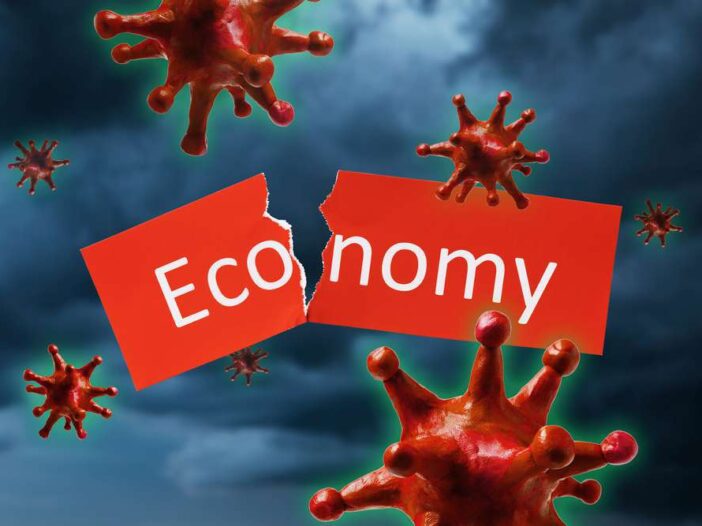It’s been three weeks since you last heard from me. A newborn and COVID conspired to keep me in action and then out of it. In fact, I write to you on day six of my seven-day bedroom quarantine.
I had prepared something for you last week but never got around to finishing it as COVID symptoms set in. The topic? ‘What if the pandemic isn’t finished with you yet?’.
I know, ironic…
It might be a little ridiculous to continue with that line of argument given COVID isn’t finished with me yet. Perhaps I’m a bit biased about the end of the pandemic after not seeing my family for five days. And no doubt you don’t want to hear about a COVID comeback either. But let’s adjust the question a little so that we can expose my real point.
What if the pandemic isn’t finished with financial markets yet?
The initial pandemic panic saw some of the fastest stock market sell-offs in history. So I think it’s an important question to ask.
Right now, stocks seem to be pricing in the presumption that we’ve seen the last wave of COVID. The pandemic is nothing more than recent history. It doesn’t matter to your investments any longer.
And it may be true that forward-looking markets are right to ignore the record COVID cases and hospitalisations that many nations face right now.
But what if COVID will be back for another go? Another variant that is more deadly or more resistant to our various medical weapons, for example?
Or what if politicians panic again and we return to another round of lockdowns, lockouts, lock-ins, and lockups?
Right now, many of the world’s leaders are trying as hard to pretend there is no pandemic as they had been trying to scare us.
The World Health Organisation is getting worried about this. It claimed that several European countries had lifted restrictions too ‘brutally’! Yes, the lifting of restrictions was too brutal…
But restrictions are also making a comeback in some places to deal with the current record wave. Austria is imposing them, China has locked down entire cities, and so on and so forth.
It’s always tempting to pretend COVID is finished with us when we’re really just in a lull between variants and waves. People living in nations that didn’t pursue a zero-COVID strategy probably understand this better than most Australians.
I went on a narrowboat holiday with the in-laws in July of 2020. (The ones who now leave plates of food outside my bedroom door.) The pandemic seemed over back then too. But since that holiday, the world has had three more waves of COVID, depending on how and where you count.
Why would it all be over now? Why would we presume this? Should investors presume it?
Martin McKee, professor of public health at the London School of Hygiene and Tropical Medicine, summed it up for Bloomberg:
‘It does seem very courageous, and indeed risky, to assume that the pandemic is over.’
During the pandemic, voices were warning us about all this. They claimed that new variants would emerge and the virus would come back in waves. After all, how many pandemics do you know of that only lasted two weeks before the curve was flattened and that was the end of it?
Now, many of those voices are still warning away these days. Not over what we’re experiencing now, but the risk that it’ll get worse in another wave or variant. One that could wreak havoc on financial markets.
Some stocks are signalling that life isn’t going to go quite back to normal. Consider, for example, the JETS ETF, which holds airline stocks. It plunged from US$30 to US$11 during the pandemic’s initial stock market crash. Then it recovered to US$28. But at the beginning of March, it had trended back down to US$17…
I’m trying to book flights to Australia from Japan. My family have never met the new generation, thanks to Australia’s pandemic border policies. But there simply aren’t any direct flights to Brisbane. It’s extraordinary for a world supposedly recovering from the pandemic.
You might be thinking that politicians won’t be able to impose lockdowns and economic chaos the way they did in 2020 and 2021, even if the pandemic does come back for another wave. But imposed lockdowns are not the only way for a pandemic to wreck an economy.
Sweden, for example, wasn’t spared much economically by its decision to avoid the same harsh measures. People still stayed at home and isolated.
Of course, I have no idea whether the pandemic will be back. Nor do I fully understand how financial markets would react if it does come back.
Perhaps another round of COVID would give central banks precisely the excuse they need to return to easy money that pumps up markets once again.
Or perhaps central banks would panic about the inflationary impact of returning to lockdown-like policies. They might actually raise interest rates!
But my underlying point remains the same.
Whatever lessons you were supposed to learn from the pandemic, they may serve you much sooner than anyone expects.
Ask yourself, what would you have done differently as the pandemic gripped financial markets last time around?
Would you have sold everything? Would you have bought into the market in the midst of the crash and be sitting on good gains now?
While everyone else is busily pretending the pandemic is over, you can be one step ahead if it isn’t.

